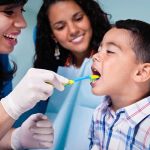Importance of Dental Checkups During Pregnancy
As an expectant mother, I cannot emphasize enough how essential it is to prioritize dental health during pregnancy. Throughout this journey, many women often overlook oral care, assuming it’s safe to wait until after childbirth. However, routine dental checkups during pregnancy are not only beneficial but necessary for both the mother's and the baby's health. In this article, I will share why dental care should be part of your prenatal routine and how it can positively affect your overall health.
1. Understanding the Connection Between Pregnancy and Oral Health
Pregnancy brings about many changes in the body, including hormonal shifts that affect your oral health. Hormones such as progesterone and estrogen surge during pregnancy, which can lead to an increased risk of gum disease, cavities, and other dental issues. For instance, "pregnancy gingivitis" is a common condition where the gums become swollen, tender, and bleed easily. If left untreated, this condition can progress into more severe periodontal disease, potentially affecting the health of your unborn child.
2. How Pregnancy Affects Your Teeth and Gums
When I was pregnant, I experienced swollen gums and slight bleeding when brushing, something I hadn’t dealt with before. My dentist explained that pregnancy hormones can cause the blood vessels in the gums to enlarge, making them more sensitive. This condition is exacerbated by morning sickness, where acidic vomit can erode tooth enamel. With constant exposure to acid, the teeth become more vulnerable to cavities and decay. Regular dental checkups ensure that your dentist can detect and treat these issues before they become serious problems.
3. The Role of Dental Checkups in Preventing Complications
Regular dental checkups are vital for preventing complications. During pregnancy, poor oral health can lead to an increased risk of preterm birth and low birth weight. This connection is still being studied, but research suggests that oral infections, like gum disease, might contribute to these pregnancy complications. That’s why it’s crucial to stay on top of dental visits, even if you think everything feels fine. Professional cleanings can remove plaque and tartar buildup that can’t be managed at home.
4. Safety of Dental Treatments During Pregnancy
Many pregnant women worry about the safety of dental treatments during pregnancy. The good news is that dental care is safe throughout pregnancy. Dentists are well aware of the precautions to take when treating pregnant women, and most procedures, like cleanings, fillings, and even root canals, are considered safe. However, certain treatments may be postponed, such as elective procedures, including teeth whitening. Always inform your dentist that you’re pregnant so they can tailor the treatment accordingly.
5. Nutrition and Its Impact on Oral Health During Pregnancy
Alongside dental checkups, maintaining a balanced diet plays a significant role in oral health during pregnancy. I learned that eating a healthy diet rich in vitamins and minerals not only nourishes my body but also strengthens my teeth and gums. Calcium, for example, is essential for the development of your baby’s bones and teeth, so it’s important to consume calcium-rich foods like dairy products, leafy greens, and fortified cereals. Additionally, vitamin C supports healthy gums, which is essential for preventing gum disease.
6. Managing Morning Sickness and Protecting Your Teeth
Dealing with morning sickness was one of the most challenging aspects of my pregnancy. The constant vomiting left my mouth feeling sour, and I was worried about the damage the stomach acid might be causing to my teeth. My dentist advised me to rinse my mouth with water after vomiting to neutralize the acids before brushing. It’s important not to brush your teeth immediately after vomiting because the enamel is temporarily softened by stomach acids. Waiting at least 30 minutes before brushing helps protect your enamel from erosion.
7. When to Schedule Your Dental Checkups
It’s ideal to schedule dental checkups during the second trimester when the risks associated with dental procedures are lower. The first trimester is a critical period for the baby’s development, and the third trimester might bring discomfort due to the growing belly. However, if you’re experiencing any pain or discomfort, don’t wait. It’s essential to address oral health issues as soon as possible to avoid complications down the road.
8. My Personal Experience with a Dental Emergency During Pregnancy
When I was pregnant with my second child, I had an unexpected dental emergency – a sudden toothache that seemed to worsen overnight. I was nervous about how it might affect my pregnancy, but I quickly visited my dentist. They assured me that dental care during pregnancy is safe, and they promptly treated my tooth infection with antibiotics that are safe for both the baby and me. This experience reinforced just how important it is to have regular dental checkups to prevent such emergencies.
9. The Benefits of Regular Dental Checkups During Pregnancy
In addition to preventing dental issues, regular checkups can also help keep you feeling your best throughout pregnancy. Cleanings and exams can reduce the risk of tooth decay, gum disease, and other oral health concerns, giving you peace of mind. For your overall health, healthy teeth and gums contribute to better digestion, a reduced risk of infection, and an overall healthier pregnancy experience.
During pregnancy, prioritizing your dental health is an important aspect of prenatal care that many expectant mothers overlook. With the right dental care and guidance from your healthcare team, you can ensure that both you and your baby stay healthy throughout this exciting journey. Don’t hesitate to schedule your dental checkup today and take control of your oral health during pregnancy.







 D3 Dental of Horsham4.0 (342 review)
D3 Dental of Horsham4.0 (342 review) Don C. Kalant Sr. DDS, FACD, FICD3.0 (32 review)
Don C. Kalant Sr. DDS, FACD, FICD3.0 (32 review) All Family Dental and Braces4.0 (689 review)
All Family Dental and Braces4.0 (689 review) Oral Surgery Hawaii4.0 (385 review)
Oral Surgery Hawaii4.0 (385 review) Spencer Dental & Braces4.0 (459 review)
Spencer Dental & Braces4.0 (459 review) Midwest Dental - Eagan4.0 (150 review)
Midwest Dental - Eagan4.0 (150 review) The Importance of Oral Health Education During Pregnancy for a Healthy Pregnancy
The Importance of Oral Health Education During Pregnancy for a Healthy Pregnancy Best Tips for Brushing Your Teeth Properly for Healthy Gums: Essential Techniques for Oral Health
Best Tips for Brushing Your Teeth Properly for Healthy Gums: Essential Techniques for Oral Health Why Skipping Dental Checkups Can Lead to Bigger Oral Health Problems
Why Skipping Dental Checkups Can Lead to Bigger Oral Health Problems Advantages of Porcelain Dental Restorations
Advantages of Porcelain Dental Restorations How Can Diabetes Cause Tooth and Gum Problems? Preventing and Managing Oral Health Issues
How Can Diabetes Cause Tooth and Gum Problems? Preventing and Managing Oral Health Issues Healthy Habits for Promoting Good Oral Health and Hygiene: Tips for a Healthy Smile
Healthy Habits for Promoting Good Oral Health and Hygiene: Tips for a Healthy Smile